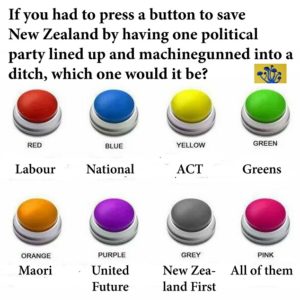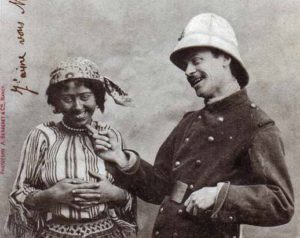
Category: justice
Fake News and Free Speech

We Used to Rape Them for Their Natural Capital, Now We Rape Them for Their Human Capital

Back in the day (19th century) the Western world completed the Scramble for Africa and held virtually the entire continent in bondage. Every part of Africa under European control was raped for its natural resources, a process that made Europe very wealthy and Africa very poor.
In recent decades, the West has more or less come to widely accept that this process was immoral. The primary reason for this is that it’s apparent in hindsight that, in order to get the populations to be compliant with colonialism and the processes of resource extraction, massive abuse and neglect had to be inflicted upon the native populations of Africa.
This abuse and neglect led directly to a widespread emotional, intellectual and cognitive impairment that has been passed down through the generations, crippling the capacity of Africans to care for themselves to this very day.
But, we also know that the more things change, the more they stay the same.
In today’s world, wealth has less to do with natural resources and more to do with human resources. After all, diamonds or oil buried deep under the earth are not valuable without the human capital that knows how to extract and process them.
In an age when the total dollar value of services are five times the value of manufacturing, why go through the expense of building an empire just to dig up shiny rocks and extract rubber?
We know that doctors, engineers, psychologists, nurses etc. are generally more than happy to abandon their own people the moment you wave a fat Western paycheck in front of them, so it’s much better to loosen the immigration policy and let the human capital come to you.
The great irony here – which has been entirely unappreciated by the left – is that, from the perspective of people in the developing world, anyone who becomes capable of making a positive difference to the people around them usually ends up disappearing before they do, abandoning those they grew up with.
After all, why should a Kenyan doctor get paid $5,000 for saving 1,000 kids from malaria when he can move to New Zealand and get paid $50,000 to wipe old white people’s arses?
The next time a wealthy person tells you that allowing mass immigration is a moral imperative because of prior colonial action in the developing world, just know that the purpose of this mass immigration is not as moral as it sounds. The purpose is to plunder the affected areas of their human capital, making the West once again wealthy at the expense of Africa and the Middle East.
The only difference with the 19th century is that, today, the capital is getting itself on planes and delivering itself to us.
Plus ça change, plus c’est la même chose.
If Violence is Unwanted, Why Force People to Consume a Drug That Makes Them Violent?

Violence is the scourge of our society. The long-term cumulative psychological damage from all the various acts of violence committed by New Zealanders is atrocious. For the most part, we all agree that violence is something that ought to be dealt to strictly, but we can’t agree on how.
This is the standard pattern of social interaction in New Zealand: Monday to Friday afternoon – work. Friday afternoon to Saturday night/Sunday morning – consume alcohol. Sunday – recover from the effects of the alcohol.
This pattern has served us for over a century.
Back in the day, life was cheap, and we didn’t care. Of course the working men who loaded up in the six o’clock swill went home and beat the shit out of their wives, but Abrahamic morality held way and women were considered the property of their menfolk.
New Zealand loves violence, but not in the way it’s usually portrayed. The All Blacks aren’t really violent because they play against consenting adult men. Rugby is sport, not violence. Kieran Read has never done anything on a sports field even one percent as violent as arresting and caging a medicinal cannabis user.
However, our culture is violent. We take people who create drugs that make people less violent and put them in cages, and we take people who create drugs that make people more violent and give them knighthoods.
Why do we do this?
Probably the main reason is a cultural artifact relating to the strategic considerations that led to New Zealand existing in the first place.
New Zealand was, after all, founded as a military colony, once British colonial planners came to appreciate that whoever controlled the Aotearoan archipelago could easily project power upon the poorly defended, but by now reasonably populated, Australian East Coast. Whoever controlled that controlled the continent.
Being founded as a military colony, it was natural for the ruling class to encourage a warrior culture among the New Zealanders, in case it was ever necessary to send them overseas to die for the Empire. This meant that New Zealanders had to be molded into a hard, cruel people, and that meant violence, and that meant alcohol.
So the booze flowed, and New Zealand bestowed all manner of honourable titles upon the men who kept the booze flowing and the fists flying. After all, if New Zealanders were given free access to a peaceful drug like cannabis, they’d be much less willing to go overseas to kill the enemies of the ruling classes of the Empire.
Some people will counter that no-one is forced to drink alcohol. Usually people making this argument are some kind of puritan or wowser who never does any drug because they hate themselves and are terrified of what they might find in their souls if they were compelled to take a look.
But the counterargument is that people are compelled to drink alcohol in New Zealand if they want to meet their natural social needs, because all attempts to build a recreational drug culture around anything other than alcohol are crushed by the Police.
Let’s not pretend that these social needs are not needs. Humans cannot survive alone – not for want of intelligence, adaptability or ingenuity but for mental health reasons. A total lack of social interaction will result in a oxytocin deficit which will lead to terminal depression.
Of course, cannabis users are just meeting up anyway, only in private and in smaller groups. This is perhaps a win for those who profit from the continuation of alcohol culture, such as shareholders in breweries and wineries. But it’s a massive loss for New Zealand.
